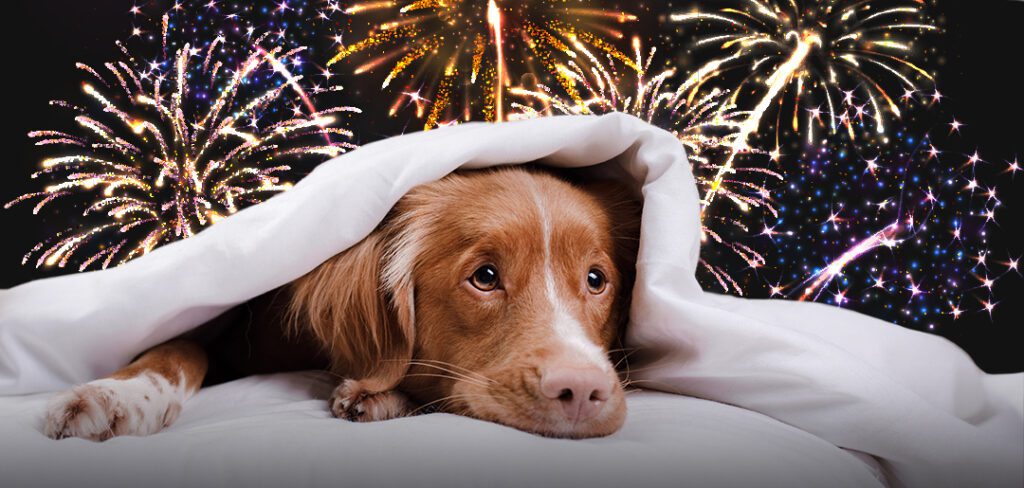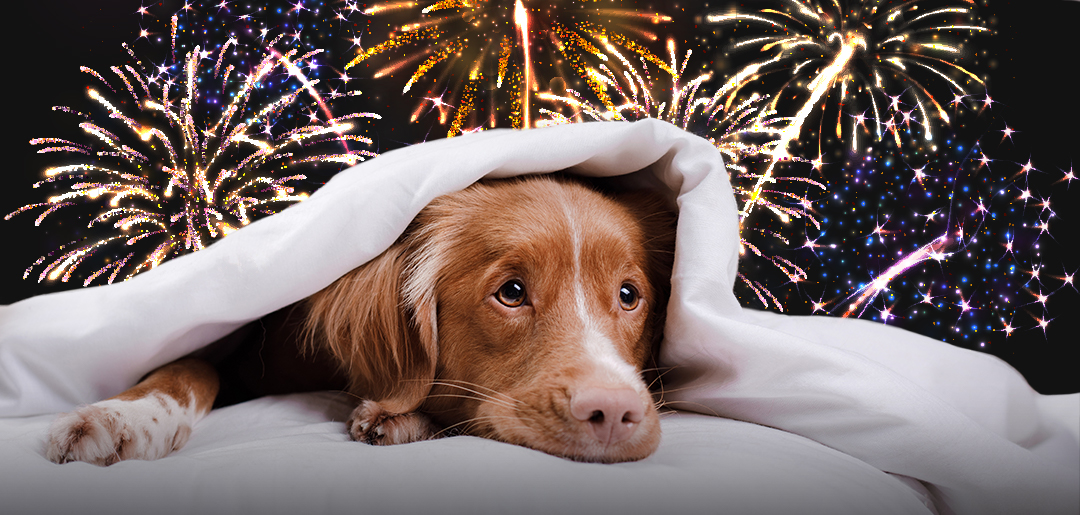Protect your pet from New Year’s fireworks
The arrival of the New Year is often celebrated with festive fireworks displays. While these colorful explosions light up the sky and bring joy to people, they can be a source of stress and fear for pets. Loud noises, bright flashes, and vibrations can cause pets to panic, leading to potentially dangerous behaviors such as running away, hiding, or even harming themselves. As a pet owner, it’s essential to understand the impact of fireworks on animals and protect your pet, take proactive steps to ensure their safety and well-being.
Why fireworks scare pets
Pets have more acute senses than humans, making them particularly sensitive to the loud sounds and bright lights of fireworks. Dogs, for example, hear frequencies far beyond the human range, and the intensity of fireworks can be overwhelming, often causing stress, shaking, or hiding behaviors. Similarly, cats are highly attuned to their surroundings, and sudden loud noises can trigger their instinct to flee or seek shelter. The unpredictability of fireworks adds to their anxiety, as pets cannot understand or anticipate the source of the commotion.
To protect your pet during these moments, it is important to create a calm and secure environment. Closing windows, using soothing music, or offering a safe space can help reduce their stress. Additionally, consulting with a veterinarian for tips or possible anxiety treatments can make a significant difference in their comfort and well-being.
Remember, being proactive and attentive can ensure your furry companions feel safe, even during noisy celebrations. Protect your pet, and let them enjoy the festive season without fear.
Common reactions of pets to fireworks
When frightened by fireworks, pets may exhibit a range of behaviors, including:
- Hiding in small, dark spaces such as closets or under furniture.
- Pacing, panting, or excessive drooling in dogs.
- Dilated pupils, trembling, or freezing in cats.
- Vocalizing, such as barking, whining, or meowing.
- Attempting to escape through doors, windows, or fences, which can lead to injuries or getting lost.
Recognizing these signs is crucial for protect your pet need during fireworks displays.
Preparing your pet before fireworks begin
- Create a safe space
Designate a quiet, comfortable area in your home where your pet can retreat during fireworks. This could be a bedroom, basement, or other secluded space away from windows. Equip the area with familiar items like their bed, favorite toys, and a piece of clothing with your scent to provide comfort. - Use calming aids
Consider natural calming aids such as pheromone diffusers, sprays, or collars designed to reduce anxiety in pets. These products mimic natural calming signals and can help create a soothing environment. - Exercise Earlier in the Day
Ensure your pet gets plenty of physical activity earlier in the day. A tired pet is more likely to remain calm and relaxed during the evening’s festivities. - Update Identification
Make sure your pet’s ID tags and microchip information are current. In case they manage to escape, this will increase the chances of a safe return. - Introduce Desensitization Training
In the weeks leading up to fireworks events, expose your pet to recordings of firework sounds at a low volume. Gradually increase the volume over time, pairing the sounds with positive experiences like treats or play to help them associate the noise with something enjoyable.
Managing your pet during fireworks
- Stay Calm and Reassuring. Pets often pick up on their owner’s emotions. Stay calm and act normally to reassure them that there’s nothing to fear. Avoid overreacting to their anxiety, as this might reinforce their fear.
- Distract with Activities. Engage your pet in activities they enjoy, such as playing with toys, practicing tricks, or offering puzzle feeders. Keeping their mind occupied can help divert their attention from the fireworks.
- Avoid Punishment. Never scold or punish your pet for their reaction to fireworks. Fear is an involuntary response, and negative reinforcement will only increase their anxiety.
- Provide Company. If possible, stay with your pet during the fireworks. Your presence can be a significant source of comfort and protect your pet. If you can’t be home, arrange for a trusted friend or family member to look after them.
Post-fireworks care
After the fireworks have ended, check your pet for any signs of stress or injuries. Provide plenty of reassurance and maintain a calm atmosphere to help them recover from the experience. Resume their regular routine as soon as possible to restore a sense of normalcy.
When to seek professional help for protect your pet
For some pets, fireworks anxiety may be severe and require professional intervention. Signs that your pet might need extra help include:
- Persistent fear responses even after the fireworks have stopped.
- Destructive behaviors, such as chewing furniture or walls.
- Extreme attempts to escape that result in injuries.
Consulting with a veterinarian or animal behaviorist can provide additional strategies to manage your pet’s anxiety. They may recommend:
- Prescription medications to help calm your pet during stressful events.
- Behavioral training tailored to your pet’s needs.
- Specialized anxiety wraps or vests, such as ThunderShirts, which apply gentle pressure to provide a sense of security.

Long-term strategies can help your pet become less fearful of fireworks over time:
- Gradual Exposure: Continue desensitization training throughout the year, gradually introducing your pet to the sound of fireworks in controlled environments.
- Positive Reinforcement: Reward your pet for calm behavior during loud noises to encourage confidence.
- Routine Adjustment: Adjust your pet’s routine to minimize exposure to fireworks, such as scheduling walks earlier in the day or using background noise during events.
Celebrating safely with your pet
The New Year is a time for celebration, filled with joy, laughter, and unforgettable moments. However, it doesn’t have to come at the expense of your pet’s well-being. Fireworks, loud gatherings, and the general hustle and bustle can create a stressful environment for your furry companions. By taking proactive measures, you can ensure your pets feel safe and secure during the festivities. Remember, your pets rely on you to protect them from the things they don’t understand.
To protect your pet, start by recognizing the potential stressors they may face. Fireworks, for example, can cause anxiety, restlessness, or even physical discomfort due to their acute senses. Preparing a quiet and comfortable space in your home can provide them with a retreat from the noise and chaos. Additionally, soothing music, pheromone diffusers, or weighted blankets can help reduce stress levels.
Fireworks may be an integral part of New Year’s celebrations, but they don’t have to mean fear and distress for your pets. By understanding their unique needs, preparing in advance, and offering comfort and reassurance, you can turn what might be a stressful experience into a manageable one. Whether through creating a designated safe zone, using calming aids, or consulting a veterinarian for professional support, your efforts can ensure your pets feel protected and cared for.
As the New Year begins, let your celebrations include your pets in a way that prioritizes their well-being. Protect your pet by showing them love, patience, and understanding, turning what could be a frightening night into one of safety and comfort. Together, you can welcome the New Year as a family, with everyone in the household feeling secure and happy.

